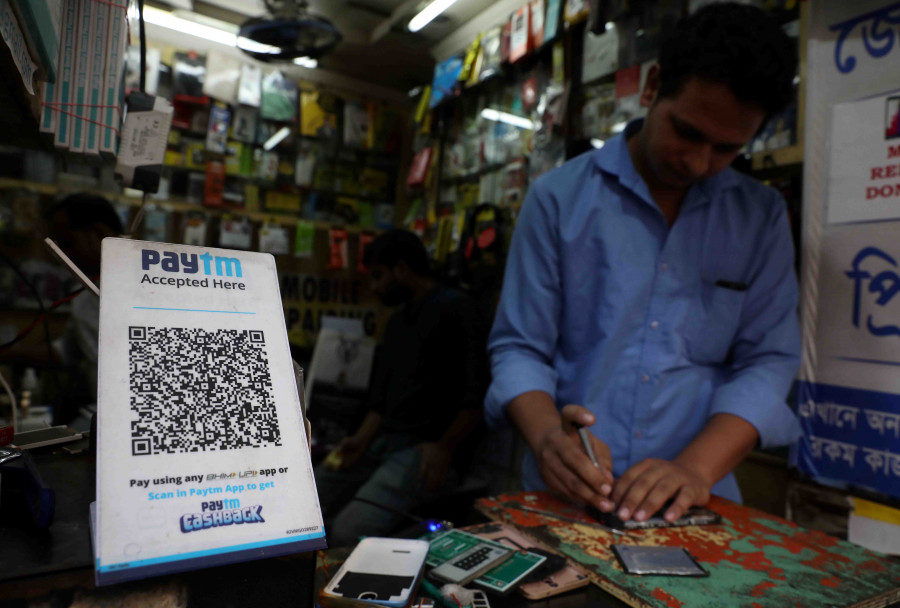An agreement is expected to be signed during Prime Minister Dahal’s planned visit to India.

Nepal and India are set to sign an agreement for cross-border digital payment using e-wallet, which is expected to boost trade and tourism by eliminating currency hassles.
The deal is expected to be signed during Prime Minister Pushpa Kamal Dahal's visit to India scheduled for sometime before mid-April.
The accord will allow Indian tourists in Nepal to make digital payments using Indian e-wallets like BharatPe, PhonePe, Google Pay and Paytm.
“Both countries have chalked out an agreement for this purpose, and the document is awaiting signatures from both countries' officials, including Nepali Prime Minister Dahal,” Indian media reported.
But Guru Prasad Poudel, executive director of Nepal Rastra Bank and chief of the payments department, said they were not aware of the plan.
“The subject may have been discussed at the higher levels, but we have not done any homework at the departmental level,” said Poudel.
Indian banknotes of denominations above Rs100 are banned in Nepal.
An overland Indian visitors’ survey conducted before the Covid-19 pandemic showed that the average length of stay of Indian tourists coming overland was 5.8 days. The average expenditure per visitor was Rs11,310.
According to Indian media reports, the advantage of travelling to Nepal is that one did not need to change money.
Tourism entrepreneurs say that the launch of digital payment services will eliminate the hassle of carrying large amounts of cash for Indian tourists and businessmen in Nepal.
Indian Ambassador to Nepal Naveen Srivastava said at a recent programme that the proposed Indian digital payment service in Nepal would boost its travel and tourism industry.
Last May, payment system operator Gateway Payment Service began cross-border payment system for the first time in Nepal based on interoperable and mobile-first technology.
The National Payment Corporation of India and its international arm International Payments had joined hands with Gateway Payment Service and Manam Infotech to deploy a unified payment interface in Nepal.
The system will enable payments for larger digital goods and boost interoperable real-time person-to-person (P2P) and merchant payment transactions (P2M) in Nepal.
The unified payment interface is a real-time payment system that provides person-to-person and person-to-merchant transactions simply, safely and securely in India.
The system is currently not on a reciprocal basis, and Nepalis are not allowed to make payments through Bharat-QR while travelling to India.
Recently Nepal Rastra Bank Governor Maha Prasad Adhikari underscored the need for greater collaboration on fintech between India and Nepal to begin a cross-border and QR payment systems for mutual benefit.
“We expect a collaboration between the Nepali and Indian private fintech companies by sharing of the infrastructure and mitigating cyber-related risks, which could benefit both countries,” he said.
Nepal’s central bank is positive about facilitating as well as enabling roles in the India-Nepal e-commerce and financial technology sector, the central bank said.
Though India is a close neighbour of Nepal, financial transactions between the two countries are complicated.
Amit Agrawal, co-founder and director of Khalti, an e-wallet service provider in Nepal, says there are many challenges for cross-border digital payment, and even if everything goes well, it will take more than a year to happen.
“Nepal Rastra Bank is not able to convert and credit Indian currency to Nepali currency in real time due to which instant payment is not able to happen,” Agrawal said.
“It requires a lot of technical things like a backend channel to transfer money, cross-border banking settlement and real-time gross settlement by the central banks which is another challenging part,” Agrawal said.
According to Nepal Rastra Bank, overall electronic payment transactions declined by 17.23 percent to Rs3.65 trillion in the period mid-January to mid-February this year compared to the same period last year.
However, the number of transactions increased by 43 percent to 73.26 million during the review period.
Though overall electronic payment transactions declined, payments made through eWallet and quick response increased during the review period.
eWallet payments during the period mid-January to mid-February rose to Rs17.11 billion from Rs14.53 billion in the same period last year. Quick response-based payments rose sharply to Rs17.76 billion from Rs6.89 billion previously.
In January, the government opened the door to foreign investors to participate in Nepal's digital payment system under a newly amended policy.
The revised guidelines allow foreign direct investment in payment service providers and payment system operators of up to 15 percent of the total capital.












